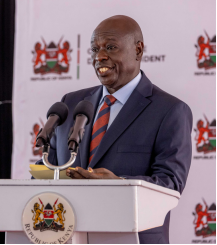Why Gachagua is a lonely man at a crossroads

The motion to impeach Geoffrey Rigathi Gachagua now leaves him with three options: legal recourse in court, pleading his case with the President, or resignation.
After months of speculation, the motion was presented in the National Assembly by an unlikely source, Kibwezi West MP Eckomas Mwengi Mutuse of Chap Chap, the party headed by Labour and Social Protection Cabinet Secretary Dr Alfred Mutua.
Mr Gachagua’s proposed impeachment is the first attempt to remove a Deputy President under the Constitution promulgated in 2010. Previous attempts have been against governors, with varying levels of success.
All other parliamentary activities have been put on hold as the motion goes for public participation this Friday, October 4, with the Deputy President invited to appear in person or with legal representation between 5 and 7 pm on October 8.
With the options at hand, the judicial officers on Monday rebuffed three separate attempts to stop the motion and directed that the petitions filed by different parties be heard next week.. The Deputy President can still explore that route, after the motion is considered in the National Assembly and the Senate, but that would be a gamble that would revive scrutiny of the relations between the Judiciary and Parliament.
If he goes the court route, he would be following a path taken by Governors such as Kawira Mwangaza and Martin Wambora, whose impeachments were overturned by the Courts. Mike Sonko (Nairobi) and Ferdinand Waititu (Kiambu) were not as lucky as their impeachments were upheld by the Supreme Court.
He could also decide to seek out his boss, President Ruto. This he has effectively done through interviews with journalists, first on Inooro TV, then with Sam Gituku on Citizen TV and on Sunday evening with journalists from Kalenjin press.
While he had been circumspect about the source of his woes, he was straightforward and spoke plainly in the last interview. He attributed his troubles to the President’s personal assistants. It was not clear whether he meant Farouk Kibet, the President’s long-time assistant, or his private secretary Isaac Maiyo.
The silence from State House and the enthusiasm of his key lieutenants in Parliament, suggest President Ruto could let the impeachment run its natural source.
In his last interview, Mr Gachagua indicated he would not be walking away, saying: “I cannot resign yet I’m not the one who gave myself this job. If I am to be chased away, let that happen. I am ready. I have seen in the newspapers and on TV and I am ready. I am a man.”
If he resigned, he would be taking the path less in Kenyan politics, but would be borrowing a leaf from Kenya’s first Vice President, Jaramogi Oginga Odinga.
Jaramogi left the government in 1966 when KANU’s politics became untenable for him. By the time he was making that decision, his powers had been diluted by having eight party vice chairmen posts created and the lucrative Home Affairs docket snatched from him.
In a heartfelt letter to President Jomo Kenyatta, he lamented that his conscience could not allow him to continue earning public money whilst having no assigned duties. This decision, though honourable, condemned him to political Siberia for the rest of his life as Kenya marched on towards a one-party state.
For now, Gachagua will be the lonely man watching as the National Assembly scrutinises the 10 grounds of his impeachment: gross violations of the Constitution, gross misconduct and violating Articles 10 and 27 of the Constitution by promoting ethnic chauvinism and open bias in his conduct as the Deputy President.
He has also been faulted for using his office to corruptly influence unnecessary and expensive renovation of his official residence in Karen and Mombasa running into the millions of shillings.
If the impeachment is successful, it will spell doom for Gachagua’s political career as he will be barred from holding any other elective or appointive public office. This follows a precedent set by Justice Mumbi Ngugi in the Sonko case, where he was barred from running in the Mombasa Gubernatorial elections.

